- Home
- Geoff Wolak
Wilco- Lone Wolf 18 Page 6
Wilco- Lone Wolf 18 Read online
Page 6
I turned to Rocko on the next table. ‘Salome has finally revealed why she came to us, and it’s to study the masturbating habits of British soldiers.’
‘We can add a chapter to that,’ he offered, those on his table laughing raucously, Salome elbowing my ribs.
‘Where’s Tiny?’ Rizzo asked.
‘On a job, but I did see her naked in Jamaica.’
‘Lucky fuck.’
‘She has a tattoo on her back. It says, don’t stop till I say.’
They threw heads back and laughed.
Ginger asked Salome, ‘Any tattoos, Major?’
‘She has none,’ I told him.
‘How would you know?’ he asked.
‘Jamaica, we shared a shower.’
‘Do tell?’ Ginger nudged.
‘Wanker,’ Salome told him.
Moran noted, ‘She’s picking up our language well enough.’
I told Ginger, my arm now removed, ‘She has a slim and pert figure, well-toned, olive skin...’
Salome turned to me. ‘He will start wanking here if you talk like that.’
‘Ginger, go out this weekend and find a girl,’ I told him. ‘Might be killed in Yemen.’
‘How’s Kate?’ Moran asked me.
‘Getting bigger, obviously, we talk on the phone sometimes. Nicholson spent a week body-guarding her and that was enough, he doesn’t want to go back. She has one opinion, and that’s the only one that counts.’
‘Doctors, all like that,’ Salome scoffed. ‘Military doctors an all. Too clever for their own good.’
‘I’m thinking you were disappointed,’ I floated.
‘Many times. Hard to respect a man.’
‘And what kind of man do you respect? A strong one?’
‘Yes, of course, I’m a soldier.’
‘No moonlight walks, flowers, candlelight dinners..?’
‘Ha,’ she scoffed, taking out a cigarette.
‘It’s no smoking,’ Moran told her.
‘Pussy English laws. I go outside.’ She squeezed past me, arse in my face. I pushed that small arse past, but she did not hit me or react.
Rocko was grinning at her, and just a few feet away as Salome moved past him. She leant in and lifted her t-shirt, to show him a boob from twelve inches away before she headed out for a cigarette. He faced me, ‘I think I’m going to add to that survey she’s conducting. You and her..?’
I shook my head. ‘Nope.’
‘Could you, and get us some polaroids?’ Rocko asked, the lads laughing.
The following Monday I travelled up to London with MP Pete, but in a suit so that I could slip in quietly. We stopped for a tea at a service station as it poured down with cold rain, ahead of schedule, soon dodging the thick traffic in West London in the rain, on to the thick traffic in Central London in the rain, and to the MOD building.
Out the car, keys left in it, we claimed a damp van with tinted windows and Mi6 minders, soon heading for a damp building near Parliament as our tinted windows steamed-up on the inside. Fortunately, there was an underground car park, but I still put on my facemask.
The minder shook his head at me. ‘That kinda labels you as Wilco. I think they sell those in the shops now, and give them out at kids’ parties!’
He was soon having to eat his words as reporters milled around the first floor, some snapping me. Up a floor, we were soon clear of reporters and waiting in a side room – no tea or coffee to hand.
Finally led next door – facemask off, Pete went and sat off to one side. I was facing ten men and two women sat in a half circle facing me, files open in front of them, the remainder of the room quite bare.
The chairman was reported by the Mi6 minders as being an ex-Army officer, and close to the new Prime Minister, so I was pretty sure that he would not be trying to trip me up here. And this lot knew of my popularity in the media – and that I would report what they said to The Sun newspaper.
The chairman focused on Pete. ‘And who are you, exactly?’
‘Military police, sir.’
I told the chairman, ‘Rumour has it … a few people have tried to kill me. And yes, I have a pistol under my arm, so does he, since the kind of people that try and kill me are very well-connected, and could penetrate this building – as they did the enquiry.’
‘Well, we’ll make do, since you are often busy – or on holiday.’ The dig was obvious, but I just smiled, and that pissed him off.
He gathered his thoughts. ‘This Select Committee was set-up as an all-party committee to investigate recent extraordinary events in London and elsewhere, to see if there were failings in the police and the intelligence services, and if the various branches of Government acted accordingly. We will report back to Parliament when ready.
‘You are here today, Major, since you seem to be at the centre of most everything that happened, and the intelligence chiefs indicated that you were aware of things that they were not, a very strange situation.
‘So first, Major, perhaps you could explain why you, as a Major in the Army, are privy to things – and involved in things – that are outside the normal chain of command.’
I had long planned for this day. Now I heaved a silent breath.
‘To start at the beginning. I was spotted by our intelligence services whilst in Riyadh with the RAF, during the Gulf War. I spoke Arabic, and I drove around Arabic officers whilst pretending that I spoke no Arabic, and I listened in for Intel.
‘Later, Intel asked the SAS to second me, and I agreed. Intel wanted me working for them, but I resisted at first. In the SAS I did well, and I did well in Northern Ireland, moving closer and closer to Intel till it was hard to know where the SAS ended and Intel began.
‘I started to undertake work for Intel, but that was interrupted by Bosnia, where I was badly injured. After I got back to full fitness there was work for Intel as much as the SAS, but I remained a soldier in uniform. It is important to note that I had one foot in the SAS, one foot in Intel.
‘After Bosnia, and after I recovered, Intel started to send me and my team on hostage rescue jobs, the first being Somalia, a success. And since everyone likes a success - Intel officers and MPs alike, I was encouraged to undertake more hostage rescues, and I’ve achieved a noteworthy rate of success over the years.
‘That success record gave me a reputation, and that reputation meant that high ranking officers and government ministers alike spoke to me directly, not through the chain of command, and I was told to develop relationships with American Intel and French Intel, and I fostered personal relations with both foreign military men and foreign Intel officers, to the point where the previous Prime Minister loaned me out to them.’
‘Loaned you out?’
‘Yes, placed me with the CIA and French Intel for jobs that were not a direct benefit to the UK.’
‘So why do them?’
‘First, because I was asked to do them, and second – because it was pointed out that our government accrued favours with people like the Americans, and that helped us directly. Point in question is the US Navy support of us in West Africa.’
‘How so?’
‘I arranged it, not the UK Government.’
‘You … arranged it? You, a Major, rang the US Navy and just asked for some ships?’
‘Yes. And this week I asked them for an entire carrier battle group for an upcoming operation. What you have to understand is the timeline, so let’s go back.’ I steepled my fingers.
‘I was loaned out to the CIA and I worked with American special forces, developing personal relations. I achieved a few successes for them, very great successes, to the point where they wanted me to go work for them. I spent a great deal of time partaking in operations for the CIA, and we did well, operations that you will never get to know about.’
‘Why will we never know about them, you’re a Major in the British Army?’
I gave him a tired look. ‘A New Zealand officer, on a secondment to the British Army, is subject to Br
itish military law, as you lot should all be well aware of. If his unit goes to war, so does he, and he kills on behalf of this country, as many did in the Second World War. He is not under the orders of New Zealand.
‘A British officer, placed with the US military, is subject to their laws and regulations for the term of that placement, and my placement with the CIA was to do their work under their laws, not ours. If you need help with that I’ll get the MOD dig out the various provisions for you.’
He did not like that dig at all. ‘I’m aware of the provisions.’
‘Obviously not, or you would understand – and not ask the question you did.’
He controlled his annoyance. ‘Moving on -’
‘I haven’t finished my story. To continue, I have been placed with foreign intelligence agencies at various times, and have built personal relations with people in those agencies, and achieved successes for them – and been decorated by their governments.
‘Whilst on such placements I infiltrated several underworld gangs, and moved up the ranks within those gangs, to the point where I get tip-offs from those gangs, tip-offs about attacks on British interests, after which I inform SIS.
‘So you can see why I’m in a position to know things that our intelligence agencies don’t know, at least till I report the facts as reported to me. And I need to make it clear at this point that I do not, and cannot, report all of the detail of operations undertaken for the CIA to our people, since it may sour the relationship.
‘Our previous Prime Minister wanted me to develop the relationships I had, and the new Prime Minister has allowed that to continue since he sees the benefits that come from those relationships.’
‘And if you’re killed..?’
‘You lose the tip-offs.’
‘A bad situation to leave ourselves in.’
‘My tip-offs are the icing on the cake, not the cake. You functioned well enough before I came along, and will do so after I’m killed.’
He gestured to the man on his left.
That man began, a glance at his notes, ‘What role did you play in the fiasco with the late Lord Michaels?’
‘As a soldier, I was sent into West Africa to stop the coup attempts, since Britain had a defence treaty with Sierra Leone. As time went on those coup attempts became more aggressive, including attempts on my life here in the UK after the press praised me personally for putting down the coups.
‘At the time, I was receiving intel from my sources, and those people back here in London organising the coups could not understand the story that I just laid out for you. Some considered me more than just a soldier, they could not fathom the tip-offs I was getting.
‘The number of attempts on my life greatly exceed those that you know about, many dealt with quietly, and most of the blame went back to the Nigerian oil barons interested in the hidden oil in Liberia.
‘It was not until this year that we knew about Lord Michaels pushing those Nigerian oil barons, and when I was tipped off about him I passed that information to SIS – who suggested that he was too powerful a man to investigate.’
‘No one should be too powerful to investigate,’ the man noted.
‘Stop talking shit,’ I shouted at him, shocking them. ‘Have you been paying attention to what happened here in London! Freemasons, lords and peers, judges and police. How many of them did you lot investigate!’ I pointed an angry finger at him. ‘Your contribution to the defence of this land and our democracy was to sit with your eyes closed to what was going on around you.’
The chairman offered me a flat palm. ‘We’re here to find out what happened, and to prevent it happening again.’
‘Ha!’ I let out, and eased back.
The next man took over, the last one sat soured faced. ‘Major, what do you see as the failings here?’
‘The failing … was the idea that those of good standing could not possibly be doing something illegal. The failing … was the idea that a member of the House of Lords would never plan to blow up a building. The failing … was that Mi5 and Mi6 were afraid to investigate such people and be criticised by the JIC and others.’
‘And the solution?’
‘A free press, and an aggressive press.’
‘We have one, but we still had the problem,’ he noted.
‘Mi5 need the authority to investigate anyone, including government ministers and civil servants, judges and police officers. They need to make random phone taps and follow up on the whispers. If a man is innocent … then his phone calls can be erased afterwards.
‘That’s a problem for you lot to sort out, the oversight of Mi5 and its remit, and the role of the auditors and the JIC. Mi5 cannot do the job and be told off by the JIC at the same time, told off because Mi5 are investigating an old school chum of the JIC chairman. And you should not be asking me that question, that’s not my remit; I am not tasked with the defence of the realm.’
‘But you are involved with the defence of the realm, at every turn. All newspaper headlines come back to you…’
‘My men are the cutting edge, and we see more action than anyone else, and – unfortunately – my role within the intelligence agencies put me centre stage in the fight against Lord Michaels and his gang. I was trying to secure Liberia as an SAS officer, and the breadcrumbs led back to London, an overlap.’
‘Did you or your men take any action on the streets of London?’ It was a very cheeky question, the chairman shooting the man a look.
‘My men do not deploy on British soil, the only exception being bodyguard work, and I teach them to have a moral outlook, not to just follow orders. When you expect a man to risk his life, it helps greatly if you explain why he’s fighting - and exactly who he’s fighting against. Before each mission I explain to the men the facts, not just issue orders to attack.
‘I tell my men: there’s no point in rescuing eight hostages if you accidentally kill eight civilians at the same time. Better to stay away. I manage to carry on with this job, and the injuries I’ve picked up, because I get the moral issues right. If I find a baby in the jungle, we rescue it not leave it behind. I lose no sleep over what I do. And if me and my men were allowed onto British streets, if I had followed the intel and my hunches, then Lord Michaels would have been dealt with a year or two back.’
‘Your suspicions were ignored?’
‘They were, yes.’
‘Why were they ignored?’
‘Foreign sources suggested Lord Michaels was up to something in West Africa, but Mi6 wanted solid evidence before it moved.’
They moved on to the lady on the left of the last speaker. ‘Where your men involved in the attacks upon NordGas or the Commertz Bank in Antwerp?’
‘No, but I wish we had been involved. I knew about NordGas years ago, but Mi6 were not about to accuse the Norwegians of anything, they wanted solid evidence, not the word of an informant.’
‘That is proper procedure after all.’
‘Rubbish!’ I shouted at her. ‘It was an informant that told me about the truck bombs on their way to Paris and London, and we stopped them.’ I took a breath, and pointed at her. ‘This is the problem! You … are the problem!
‘My informants were 100% accurate at every step, and we stopped the bombs, but you don’t want me to use those informants or for Mi6 to act upon them because you have procedures. Those procedures nearly saw a tall London tower brought down with three thousand people inside.
‘When I first reported that threat no one believed it, everyone though that it was just too far-fetched. Then we found the thermite on a truck, then we found the faults with the building and the inflated insurance, and finally it was not so far-fetched – but the delay could have killed thousands.
‘If I get a tip off next week about a nuclear bomb heading to London, do you want me to pass it on? Well, do you?’
‘Yes, of course.’
‘Why yes of course? Why believe the tip-off when the same tip-offs about Lord Michaels were ignored, when the tip-
off about bringing down that building was ignored. Just who the hell decides to act or not act? Who plays god with the lives of Londoners, Madam?’
The chairman cut in, ‘We would hope that a tip-off of substance would be investigated. Obviously, a suspicion about an individual carries less weight.’
‘Well here’s a moral dilemma for you. In order to gain the relationships I have I broke many laws, and the people who tipped me off about the truck bombs were wanted men, hardened criminals that kill for fun. You willing to accept my tip-offs, from a legal standpoint?’
‘Well, from a legal standpoint, it’s a grey area, but does seem to be stretching a few laws. I would hope that the ends justify the means.’
‘And if I torture someone to obtain information about a bomb in London..?’
‘Our laws do not allow you to torture someone.’
‘Fine, just checking. I’d allow a bomb in London to go off, not harass the bomb maker. Good to know.’
He sighed theatrically. ‘We cannot become as bad as the criminals, no matter how bad the situation, with the consequences that a bomb might go off.’
‘I break the law every day, by maintaining my links to foreign intelligence agencies that do torture people, and I break the law when I get tip-offs from underworld sources instead of reporting those people to the police to arrest. How should I proceed – exactly?’
‘It’s a grey area, Major, and work for Mi6 is often a grey area, and our relationships with people like the Americans is not dependent on them applying our laws - we know they go further, and people like the Israelis go much further, but we still have a working relationship and we cooperate closely, so we know it’s a fudge and a grey area and we struggle through as best we can.
‘Being a democracy with laws, we have to treat the man who sets of a bomb with compassion, even if we’d like to hang him in the streets. That is the price we pay for freedom, and how we avoid a police state. Would you not agree?’
I wondered why he was going easy on me. ‘Yes, I do agree actually. I just need you to understand that I live in your grey area, no fucking help at all from those above me to steer a course between legal and illegal.’

 K2 book 1
K2 book 1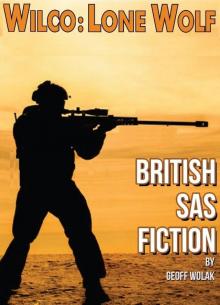 Wilco- Lone Wolf 22
Wilco- Lone Wolf 22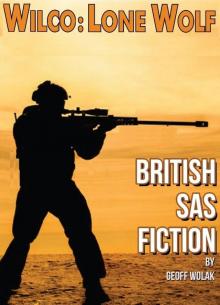 Wilco- Lone Wolf 20
Wilco- Lone Wolf 20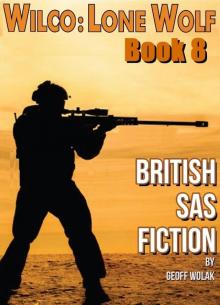 Wilco- Lone Wolf 8
Wilco- Lone Wolf 8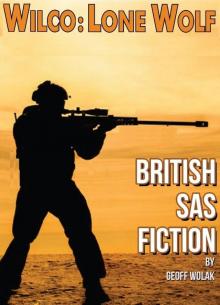 Wilco- Lone Wolf 17
Wilco- Lone Wolf 17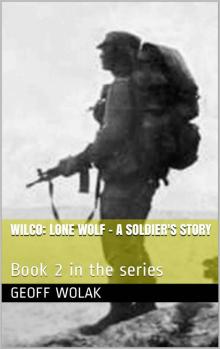 Wilco- Lone Wolf 2
Wilco- Lone Wolf 2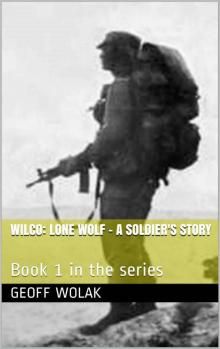 Wilco- Lone Wolf 1
Wilco- Lone Wolf 1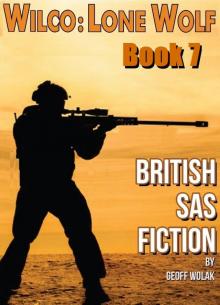 Wilco- Lone Wolf 7
Wilco- Lone Wolf 7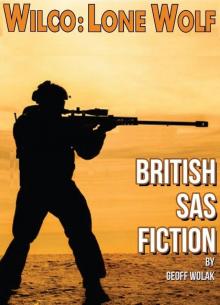 Wilco- Lone Wolf 15
Wilco- Lone Wolf 15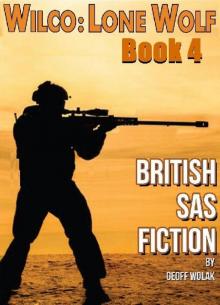 Wilco- Lone Wolf - Book 4
Wilco- Lone Wolf - Book 4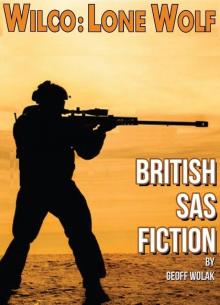 Wilco- Lone Wolf 21
Wilco- Lone Wolf 21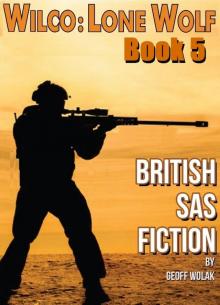 Wilco- Lone Wolf 5
Wilco- Lone Wolf 5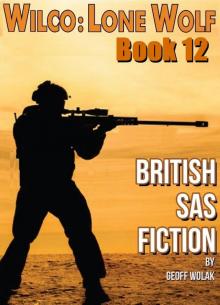 Wilco- Lone Wolf 12
Wilco- Lone Wolf 12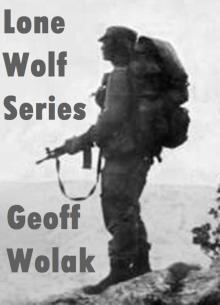 Wilco- Lone Wolf 10
Wilco- Lone Wolf 10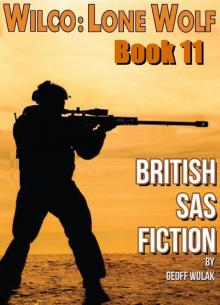 Wilco- Lone Wolf 11
Wilco- Lone Wolf 11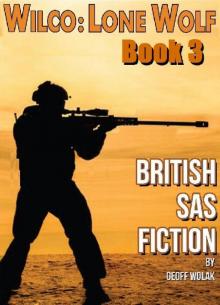 Wilco- Lone Wolf - Book 3
Wilco- Lone Wolf - Book 3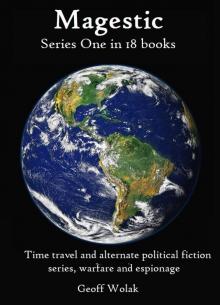 Magestic 3
Magestic 3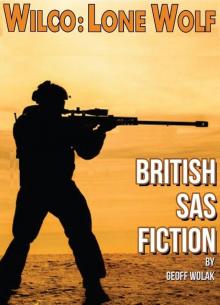 Wilco- Lone Wolf 19
Wilco- Lone Wolf 19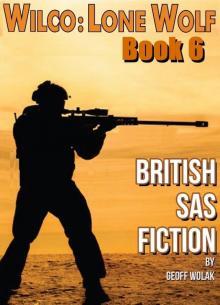 Wilco- Lone Wolf 6
Wilco- Lone Wolf 6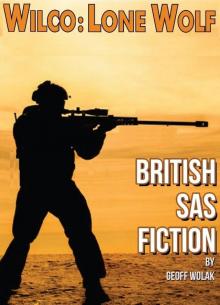 Wilco- Lone Wolf 16
Wilco- Lone Wolf 16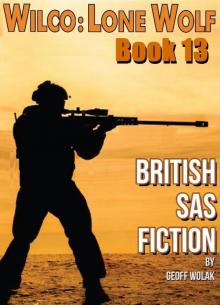 Wilco- Lone Wolf 13
Wilco- Lone Wolf 13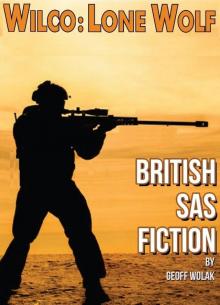 Wilco- Lone Wolf 18
Wilco- Lone Wolf 18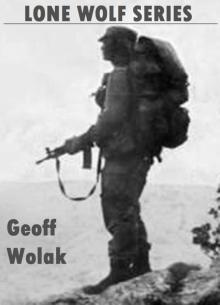 Wilco- Lone Wolf 9
Wilco- Lone Wolf 9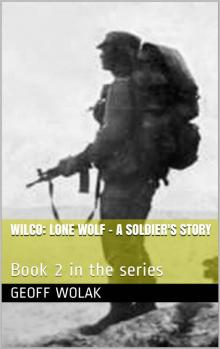 Wilco: Lone Wolf - Book 2: Book 2 in the series (Book 2 of 10)
Wilco: Lone Wolf - Book 2: Book 2 in the series (Book 2 of 10)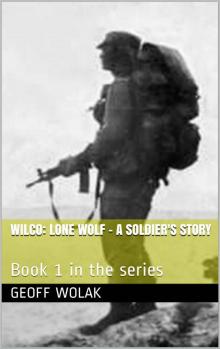 Wilco: Lone Wolf - book 1: Book 1 in the series (Part of an ongoing series)
Wilco: Lone Wolf - book 1: Book 1 in the series (Part of an ongoing series)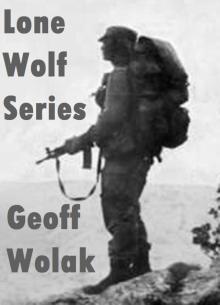 Wilco: Lone Wolf, Book 10: Book 10 in the series
Wilco: Lone Wolf, Book 10: Book 10 in the series